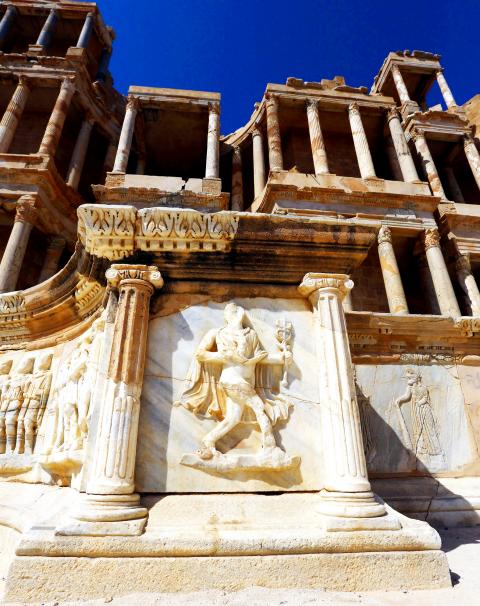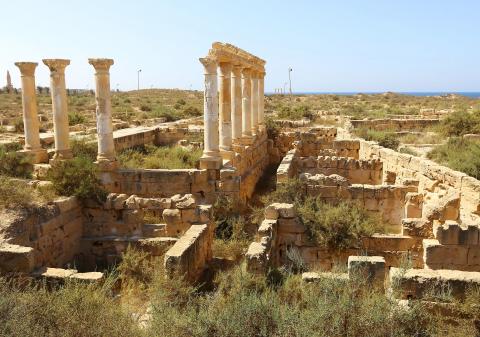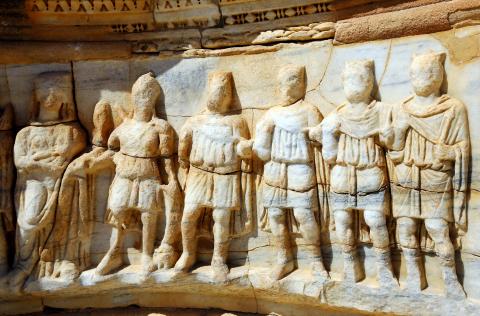Perched on the edge of Libya’s Mediterranean coast, the ancient city of Sabratha remains an awe-inspiring spectacle, the pink columns of its amphitheater towering above turquoise waters.
But the world heritage site is classed as “endangered” by UNESCO, its majestic structures pockmarked by mortar and small arms fire.
Shell casings and bullets still litter the surrounding earth, a year after clashes between rival armed groups.

Photo: AFP
Locals say snipers positioned themselves at the top of the amphitheater, once a jewel of the Roman Empire.
Bringing bloodshed back to the gladiatorial arena some 18 centuries after it was built, 39 people were killed and 300 wounded in the fighting.
Today, the site around 70 kilometers from the capital lies eerily abandoned, encircled by parched grass and weeds. Since the toppling and killing of Libya’s dictator Moamer Kadhafi in a 2011 uprising, Sabratha has become a key departure point for illegal migration.

Photo: AFP
Smugglers and militias have profited amply from a chronic security vacuum.
It is from the long and deserted shores a few kilometers from ancient Sabratha that most migrants start their perilous boat journeys towards Europe.
‘PERMANENT DANGER’

Photo: AFP
UNESCO declared Sabratha to be at risk in July 2016, along with four other Libyan sites on its World Heritage list.
The UN’s cultural organization based its decision on two factors — “damage already caused” and vulnerability to future destruction. It noted that “armed groups are present on these sites or in their immediate proximity.”
Experts fear worse is to come for the country’s historic sites, as armed groups continue to vie for ascendancy.
Libya’s archaeological heritage is at great risk, warns Mohamad al-Chakchouki, head of the North African country’s department of antiquities.
The “entrenchment of armed groups inside archaeological sites and the battles which have unfolded near the sites, including Sabratha, pose a permanent danger,” he said.
The conservation of sites was once entrusted to Western teams.
But these experts have not traveled to Libya “for four years, because of the chaos and insecurity,” said Chakchouki. Spread out over 90 hectares, including a part engulfed by the sea, Sabratha is one of three former cities that constituted Roman Tripolitania.
The others are Oea — modern-day Tripoli — and Leptis Magna in western Libya that was one of the sites classed as endangered by UNESCO two years ago.
At the mercy of the scorching summer sun and the salty sea breeze, Sabratha suffers from stone erosion and degradation, said Mohamad Abu Ajela, an official at the city’s office of antiquities.
But the “damage caused by man is a greater fear,” he said.
A Spanish archaeological mission recently visited Sabratha and signed an agreement to restore some areas, including the theater.
But completion of the work “depends on the security situation,” Ajela said.
URBANIZATION AND LOOTING
Alongside armed conflict, several protected Libyan sites are threatened by uncontrolled urban expansion.
One example is Cyrene, an ancient Greek city in northeastern Libya.
Exploiting the chaos, people have claimed ownership of land and built within the archaeological site’s perimeter. Looting is another threat to these sites, as the lack of security has led to illicit excavation and smuggling
of antiquities.
Several thefts of ancient objects have been reported.
In March, Spain’s interior ministry announced the seizure “of numerous works of art” from the Cyrenaica and Tripolitania regions, including seven mosaics, sarcophagi and pieces of Egyptian origin.
Madrid said it had proof that two necropolises were looted by “terrorist groups.”
Officials in the antiquities department attempt to save what they can, often through desperate measures.
Museums have closed — including in Tripoli — and some archaeological treasures have been transferred to a “safe place,” Chakchouki said.

The canonical shot of an East Asian city is a night skyline studded with towering apartment and office buildings, bright with neon and plastic signage, a landscape of energy and modernity. Another classic image is the same city seen from above, in which identical apartment towers march across the city, spilling out over nearby geography, like stylized soldiers colonizing new territory in a board game. Densely populated dynamic conurbations of money, technological innovation and convenience, it is hard to see the cities of East Asia as what they truly are: necropolises. Why is this? The East Asian development model, with

June 16 to June 22 The following flyer appeared on the streets of Hsinchu on June 12, 1895: “Taipei has already fallen to the Japanese barbarians, who have brought great misery to our land and people. We heard that the Japanese occupiers will tax our gardens, our houses, our bodies, and even our chickens, dogs, cows and pigs. They wear their hair wild, carve their teeth, tattoo their foreheads, wear strange clothes and speak a strange language. How can we be ruled by such people?” Posted by civilian militia leader Wu Tang-hsing (吳湯興), it was a call to arms to retake

This is a deeply unsettling period in Taiwan. Uncertainties are everywhere while everyone waits for a small army of other shoes to drop on nearly every front. During challenging times, interesting political changes can happen, yet all three major political parties are beset with scandals, strife and self-inflicted wounds. As the ruling party, the Democratic Progressive Party (DPP) is held accountable for not only the challenges to the party, but also the nation. Taiwan is geopolitically and economically under threat. Domestically, the administration is under siege by the opposition-controlled legislature and growing discontent with what opponents characterize as arrogant, autocratic

When Lisa, 20, laces into her ultra-high heels for her shift at a strip club in Ukraine’s Kharkiv, she knows that aside from dancing, she will have to comfort traumatized soldiers. Since Russia’s 2022 invasion, exhausted troops are the main clientele of the Flash Dancers club in the center of the northeastern city, just 20 kilometers from Russian forces. For some customers, it provides an “escape” from the war, said Valerya Zavatska — a 25-year-old law graduate who runs the club with her mother, an ex-dancer. But many are not there just for the show. They “want to talk about what hurts,” she